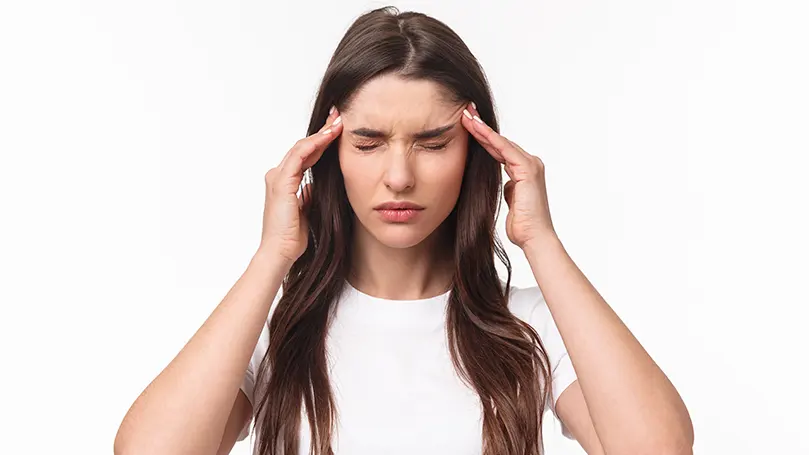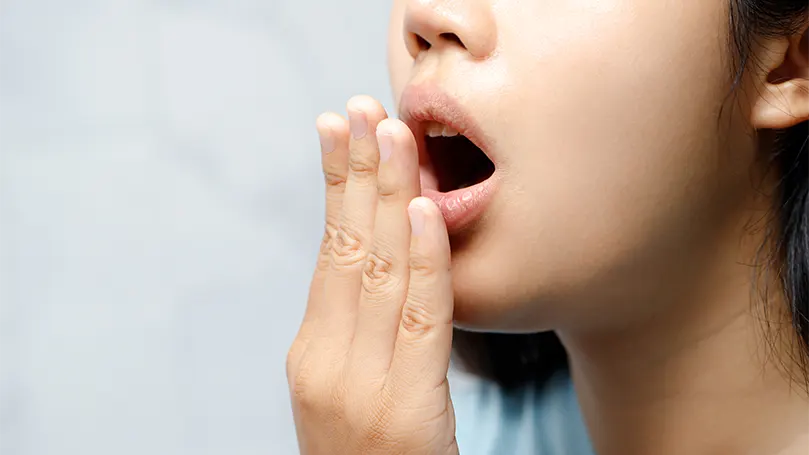What is sinus infection & why does it cause neck pain?
You must have heard of sinuses. But you probably don't know exactly how many there are, where they are located and what their role is. We will explain to you before we continue to talk about sinus infection. In Latin, sinus means cavity. The sinuses are air-filled cavities in the head. There are 4 types o: ethmoidal, maxillary, frontal and sphenoid sinuses. They are all located around your eyes.
The role of the sinus is protective, they influence the voice sound and produce mucus. Mucus is the only thing found in healthy sinuses, and besides, they are empty. When sinus infections occur, the tissue swells and the sinuses are no longer empty but full of fluid, making it difficult to breathe.

Inflammation of the sinuses is medically called sinusitis. The most common cause of acute sinusitis is bacteria and this is what we usually call the cold. Sinusitis can be chronic and recurring too. It is not uncommon to feel neck pain when you have sinusitis.
Sinusitis usually causes a headache, and then the pain spreads to the neck. The neck and trapezius muscles are most affected. You will feel stiff or sore muscles you may want to stretch. Be careful if you decide to stretch your neck, because maybe neck pain and sinusitis are not related, but neck pain is a consequence of the injury or some other problem.
How to relieve sinus neck pain?
No pain is pleasant, but sinus neck pain can certainly be ranked among the worst. It’s not the kind of pain we can ignore. That is why you have to act as quickly as possible in order for the pain to disappear. Therapy should be a combination of medications that will help cure sinusitis and painkillers that will make the pain bearable.
Anti-inflammatory medications
Non-steroidal anti-inflammatory drugs, also known by the acronym NSAIDs, have multiple functions – to reduce pain, inflammation and fever. This makes them ideal for the symptomatic treatment of sinusitis.

Most non-steroidal anti-inflammatory drugs, such as ibuprofen, are OTC, which means you don't need a doctor's prescription to buy them at a pharmacy, and they are often even available in supermarkets. In general, they work very similarly but everyone finds one type that helps most. Also, some prefer tablets and capsules, while some find creams and gels more effective. In case of sinus neck pain, you can combine both, but be careful not to take too much.
Decongestants
Like non-steroidal anti-inflammatory drugs, decongestants offer only temporary relief and are therefore part of symptomatic therapy. But it is equally important in moments when you are very nervous because of pain and a stuffy nose.

You can also try antihistamine medications, but decongestants are usually more effective. They reduce the swelling of the blood vessels in your nose and this will help to clear your nose. Sudafed is one of the most famous decongestants brand names in the UK. You can find tablets, and buy also nasal sprays. Decongestants are sold as OTC, but if you have high blood pressure, diabetes or any other chronic illness, seek medical advice.
Antibiotics
Unlike the previous two, antibiotics are there to cure. Although many misuse them for viruses, antibiotics are only suitable for bacterial infections. They kill bacteria and at the same time prevent their growth.

Antibiotics have been used for almost 100 years and have reduced the number of deaths caused by bacteria many times over. As bacteria are the most common cause of sinusitis, then antibiotics are usually the best solution. But antibiotics are not OTC and you need to get a prescription from a doctor to buy them and start using them. Although very effective, they usually take a few days so don't worry if you don't feel better after a few hours. Be patient and use symptomatic therapy until antibiotics cure you.
Nasal spray
There are two types of nasal sprays. One type is the decongestants we have already talked about, and the other type is nasal corticosteroids. The advantage of nasal corticosteroids over nasal decongestants is that nasal corticosteroids are not addictive and won’t cause tissue atrophy and damage. But they have more side effects and should not be taken lightly.

Nasal corticosteroids are used for swelling and inflammation caused by allergies and asthma. If you have ever taken steroid medications and experienced a side effect or there is a family history with steroid medications, tell your doctor. Saline nasal sprays can be used as safe prevention.
The symptoms of sinus neck pain & infections
Sinusitis symptoms are sometimes very obvious. But there are situations when the symptoms are unusual and then it can lead you astray. If you notice any of the following symptoms, tell the doctor that you think you may have sinus infection.
Sinus pain & pressure
This is one of the most obvious symptoms. The pain can be localized exactly where the sinuses are, usually above the orbital bone or below the eyes. Pressure can be an accompanying symptom as well. That feeling of pressure due to nasal congestion is different than with high blood pressure. If you feel pain and pressure, it will be immediately clear to you what it is.

Headache
The pain does not have to be only in the places where the sinuses are, but it can happen that your whole head hurts, as when you have a migraine. Migraine usually lasts 4 to 72 hours and is accompanied by other symptoms. If the headache does not go away even after 2 to 3 days, and you have taken painkillers and magnesium, then it is not a migraine but sinusitis.

Coughing
Excessive production of mucus in the nose during sinusitis can lead to coughing. You will expel some of it through your nose, but some of the mucus will end up in your lungs. In the beginning, it will be an irritating cough, until you start expelling sputum. To speed up this process, you can use various home remedies as well as OTC syrups and tablets.

Fatigue
When you have sinusitis, it means that the bacteria have invaded your body and now the immune system is fighting them. That is why you feel tired and it is advisable to rest for a few days before you get back to work. Allergies, as well as allergy medications, can also cause somnolence and fatigue.

Bad breath
Bad breath may seem like a strange symptom, but it is actually very common and logical. Infected mucus has a very unpleasant odour and then when air comes out of your nose and mouth, that odour comes out as well. Also, one of the symptoms of colds is dry mouth which further contributes to bad breath.

Fever
Fever is another response of your body to fight bacteria. By raising the temperature, your body tries to create an unfavorable environment for the bacteria. Sinusitis can cause a mild fever, but also a very high fever over 38C. Try lowering your body temperature using NSAIDs. If the temperature is above 39C, it can be considered a medical emergency.

Coloured mucus
Viral infections can also cause too much mucus in your sinuses and later in your lungs. But there is one significant difference in mucus caused by bacteria and viruses. Bacteria cause coloured mucus, while mucus is clear if you have a viral infection or allergy. This is the simplest way to determine the origin of the problem.

Tooth pain
Sinus infection is a common root of a toothache. Toothache almost always occurs in the upper back teeth when you have sinus infection, and almost never in the lower front teeth. This is quite logical because the sinus cavities are located just above the upper jaw and when the sinus tissue is inflamed, that inflammation is also transmitted to the tissue surrounding the teeth. We should not forget that the same nerves pass through that part of the body, so nerves can send pain to other places too.

Can weather change cause neck pain?
There is a possibility that your muscles hurt due to the change of weather. At the same time, the change of weather, and especially the arrival of spring, can cause allergies, which is closely related to sinus problems. Pollen in the air causes inflammation of the nasal passages. These inflammations can affect the joints and muscles as well. That is why many allergy sufferers hate spring, because it is the period when they feel pain in the sinuses and neck, and their nose is constantly stuffy. Nasal sprays bring one relief, but very short, only for an hour or two.
Conclusion
Many people suffer from chronic sinus infection symptoms. All those whose symptoms last longer than two months are considered to have chronic sinusitis. Recurring sinusitis is experienced by those who experience symptoms several times a year, but have no problems in between.
Sinusitis can also be acute, as a result of a bacterial infection or allergy. As the sinuses are located in the head, it means that they are close to the brain and a large number of nerves, so the pain is very strong. The pain can spread to the teeth, and most people feel pain in the neck at these times.

It is best to combine painkillers and antibiotics because that should solve the problem of bacterial sinusitis quickly. If the cause are seasonal allergies, then the approach is different. Generally, sinusitis is not dangerous and in many cases it can go away on its own, but the symptoms are so unpleasant that you will certainly not want to wait a week or more for the symptoms to go away.















There are no comments yet
"*" indicates required fields